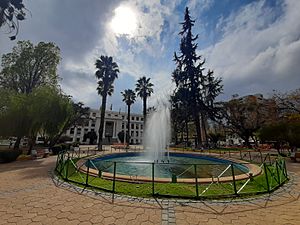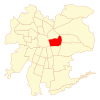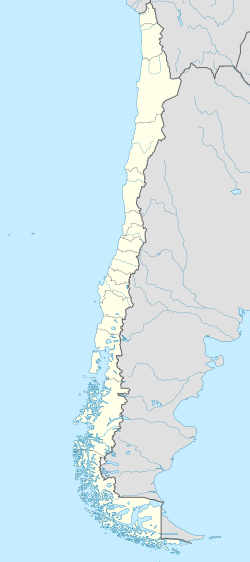Ñuñoa facts for kids
Quick facts for kids
Ñuñoa
|
||||||
|---|---|---|---|---|---|---|

Ñuñoa City Hall
|
||||||
|
||||||
| Country | Chile | |||||
| Region | Metro Santiago | |||||
| Province | Santiago | |||||
| Government | ||||||
| • Type | Municipal | |||||
| Area | ||||||
| • Total | 16.9 km2 (6.5 sq mi) | |||||
| Population
(2021 Estimated)
|
||||||
| • Total | 255,823 | |||||
| • Density | 15,140/km2 (39,210/sq mi) | |||||
| • Urban | 255,823 | |||||
| • Rural | 0 | |||||
| Residents by gender | ||||||
| • Male | 124,749 | |||||
| • Female | 131,074 | |||||
| Time zone | UTC-4 (CLT) | |||||
| • Summer (DST) | UTC-3 (CLST) | |||||
| Area code(s) | 56 + | |||||
| Website | Municipality of Ñuñoa | |||||
Ñuñoa (Spanish pronunciation: [ɲuˈɲo.a]) is a commune in Santiago. It is located in the northeastern part of the city. The name Ñuñoa comes from the Mapudungun language. It means "place of yellow flowers."
Contents
What is Ñuñoa Like?
Ñuñoa has become a popular place for young working people to live. This is because it has many good qualities and is in a convenient spot. Its population grew a lot from 2002 to 2017. Most people living here are from medium to upper-middle-income families. Some older residents are concerned that new buildings are changing the neighborhood's traditional feel.
The commune of Ñuñoa has many public services and businesses. It also has a good public transportation system. The main business area is along Irarrázaval Avenue. This street is about 6 kilometers long and goes across the whole commune. It is easy to get to by using Line 3 of the Santiago Metro.
Famous Places in Ñuñoa
Ñuñoa is home to some important landmarks. It has Santiago's only mosque. It also has Chile's largest sports complex and national stadium, called Estadio Nacional. There are also two lively neighborhoods, Plaza Ñuñoa and Barrio Italia. Barrio Italia is shared with the Providencia commune.
In 2021, Ñuñoa was ranked as the fourth best commune to live in. This shows that it offers good living conditions. Ñuñoa is one of the oldest parts of eastern Santiago. It has many conveniences like subways, banks, and shopping areas. Even with all these services, it remains a mostly quiet and residential area.
Who Lives in Ñuñoa?
According to a 2002 census, Ñuñoa covers an area of 16.9 square kilometers. It had 163,511 residents at that time. Out of these, 73,215 were male and 90,296 were female. The entire commune is an urban area, meaning it is a city or town. The population decreased slightly from 1992 to 2002.
Notable Residents
Many well-known people have lived in Ñuñoa. These include politicians, writers, and artists.
- Soledad Alvear, a senator
- José Balmes, a painter
- Mercedes Valdivieso, a writer
- José Miguel Varas, a journalist
- Fernando Villegas, a writer
- Alex Deferrari, a musician
- José Luis Rosasco, a writer
- Poli Delano, a writer
How Ñuñoa is Governed?
Ñuñoa is a third-level administrative division of Chile. It is managed by a municipal council. This council is led by a mayor. The mayor is elected for a four-year term. The current mayor is Emilia Ríos.
The municipal council helps the mayor run the commune. It includes several members from different political groups. These groups work together to make decisions for Ñuñoa.
Ñuñoa is also part of a larger electoral district. This district elects representatives to the Chamber of Deputies. These representatives help make laws for the country. Ñuñoa is also part of a senatorial constituency. This constituency elects members to the Senate, which is another part of the national government.
Schools in Ñuñoa
Ñuñoa has several schools for students. These include both private and public schools.
Private Schools
- Colegio Suizo de Santiago
- Kendal English School
- Colegio Akros
- Escuela Amaranta Gómez Regalado
- Colegio Francisco Encina
- Liceo Experimental Manuel de Salas
Public Schools
- Colegio República de Costa Rica
See also
 In Spanish: Ñuñoa para niños
In Spanish: Ñuñoa para niños
 | Emma Amos |
 | Edward Mitchell Bannister |
 | Larry D. Alexander |
 | Ernie Barnes |





